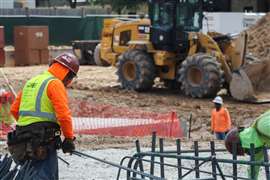Biden’s overtime pay rule struck down in Texas court
18 November 2024
A US Department of Labor rule that would have made about four million more salaried US workers, including those in construction, eligible for overtime pay, has been struck down in a Texas court.
 A construction worker handles rebar at a work site in Houston, Texas (Image: REUTERS/Evan Garcia/File Photo)
A construction worker handles rebar at a work site in Houston, Texas (Image: REUTERS/Evan Garcia/File Photo)
U.S. District Judge Sean Jordan in Sherman, Texas, said the U.S. Department’ final rule, called Defining and Delimiting the Exemptions for Executive, Administrative, Professional, Outside Sales, and Computer Employees, improperly bases eligibility for overtime pay on workers’ wages rather than their job duties.
Federal law exempts workers with “executive, administrative, and professional” (EAP) duties from receiving overtime pay, and the Labor Department has used salary as one factor in deciding when that applies for decades.
The state of Texas and business groups including Associated Builders and Contractors (ABC) filed lawsuits challenging the rule.
The rule would have required employers to pay overtime premiums to salaried workers who earn less than $1,128 per week, or about $58,600 per year, when they work more than 40 hours in a week, beginning 1 January 2025. It had also temporarily raised the threshold to about $44,000 per year on 1 July. Salary thresholds would have been updated every three years starting on 1 July 2027.
The previous threshold of about $35,500, which was set in 2019, will now be back in effect.
Ben Brubeck, ABC vice president of regulatory, labor and state affairs said the decision was “no surprise”.
He said, “Some ABC members employ workers who would have lost their exempt status as of Jan. 1 because of the 2024 overtime rule’s scheduled increase. This would have disrupted the construction industry, specifically harming small businesses, restricting employee workplace flexibility in setting schedules and hours, and hurting career advancement opportunities.”
“The 2024 rule’s radical increase in the salary threshold for exemption would have also further complicated the current economic outlook,” he added. “Multiple industries, like construction, are grappling with uncertain economic conditions such as high interest rates, supply chain disruptions, materials price inflation and workforce shortages, all of which push operational costs ever higher. Specifically, ABC estimates that the construction industry must hire more than half a million additional workers in 2024 to meet demand. The rule’s triennial automatic indexing provision would have exacerbated its harmful impact on businesses and added to rampant inflation that is already harming the economy as a whole.”
Judge Sean Jordan, who was appointed by Republican President-elect Donald Trump in his first term, struck down the rule after saying in June that it was likely invalid and temporarily blocking it from being applied to Texas state employees.
The Department of Labor can seek review of the ruling in the New Orleans-based 5th U.S. Circuit Court of Appeals but the incoming Trump administration could abandon any attempt to revive the rule.
CONECTAR-SE COM A EQUIPE




